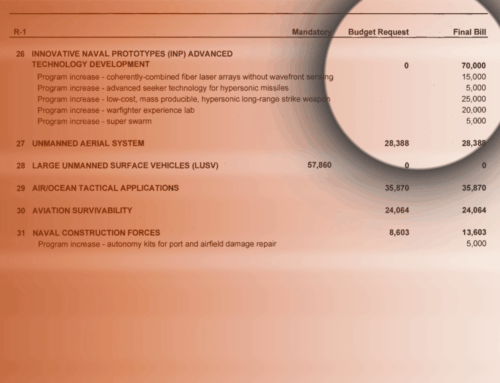Senate Republicans are scrambling to craft their version of President Trump’s massive budget reconciliation package before a self-imposed July 4th deadline – and they’re making the House’s already bloated bill even worse. The Senate Armed Services Committee wants to throw an additional $6 billion at Pentagon spending, bringing the total national security increase to $156 billion, including more money for the over-budget Sentinel ICBM program and the unfeasible “Golden Dome” missile defense system.
Meanwhile, other provisions would roll back hard-won oil and gas reforms, slashing royalty rates from 16.67% back to 12.5% and reinstating a non-competitive leasing loophole that lets companies grab federal land for just $75. With most Senate committees skipping markup hearings to meet the artificial deadline, this reconciliation package is shaping up to be one of the most expensive and least transparent in recent memory.
TCS Vice President Autumn Hanna, Policy Analyst Gabe Murphy, and Director of Research Josh Sewell break down the wasteful spending, parliamentary hurdles, and political realities facing this “one big beautiful bill.
Transcript
Announcer:
Welcome to Budget Watchdog All Federal, the podcast dedicated to making sense of the budget spending and tax issues facing the nation. Cut through the partisan rhetoric and talking points for the facts about what’s being talked about, bandied about and pushed to Washington, brought to you by taxpayers for common sense. And now the host of Budget Watchdog AF TCS President Steve Ellis.
Steve Ellis:
Welcome to All American Taxpayers Seeking Common Sense. You’ve made it to the right place for 30 years. TCS that’s taxpayers for common sense, has served as an independent nonpartisan budget watchdog group based in Washington DC We believe in fiscal policy for America that is based on facts. We believe in transparency and accountability because no matter where you are in the political spectrum, no one wants to see their tax dollars wasted. It’s mid-June 2025 and the Senate is now grappling with President Trump’s so-called one big beautiful Bill, the massive budget reconciliation package to House Pass last month with a self-imposed July 4th deadline. Looming Senate Republicans are scrambling to craft their version while facing mounting pressure from all sides. Here to keep us up to speed and stay on track. Our TCS Vice President, autumn Hannah, TCS policy Analyst, Gabe Murphy and our Director of Research and policy, Josh Sewell. Welcome back. Autumn, Gabe and Josh.
Autumn Hanna:
Thanks, Steve. Great to be here.
Josh Sewell:
Yeah, thanks Steve. It’s always good to be on. Ditto.
Steve Ellis:
Alright, well let’s just get right into this. Gabe, as our National Security Point person, what are you seeing unfolding for the Pentagon in reconciliation?
Gabe Murphy:
Well, Steve, the Senate Armed Services Committee dropped their proposed bill text last week, and believe it or not, they actually felt the house passed. Bills 150 billion for the Pentagon and other national security spending wasn’t enough. No. For them, 156 billion sounded just right. Beyond upping the ante on this Pentagon spending spree, the process has left a lot to be desired. Unlike the house, most Senate committees aren’t even bothering to mark up these bills. Instead, they’re skipping that tedious nod to representative democracy to just accelerate the process and try and meet this July 4th deadline.
Steve Ellis:
Gabe, that maneuver really jumped out to me too. When did public debate and amendments become such nice to haves rather than a fundamental part of the legislative process? Okay, let’s dig into the numbers. What exactly is the Senate proposing that goes beyond what the house already passed with their 150 billion?
Gabe Murphy:
Well, with the $5.8 billion increase in top line national security spending above the house’s, $150 billion increase. The Senate goes even farther than the house on some of the most wasteful national security investments we’re seeing in this bill. They added an additional billion dollars, for instance, on top of the houses, 1.5 billion for risk reduction activities for the Sentinel Intercontinental Ballistic Missile Program. That’s the same program that was 37% over budget at the beginning of 2024 and then ballooned to 81% over budget by July.
Steve Ellis:
Right. Risk reduction activities, that’s some creative budgeting language right there, Gabe.
Gabe Murphy:
Yeah, it sure is. I mean, as we noted in our analysis, these more accurately could have been called paying for things we didn’t think about when we insisted this was the only viable cost effective option for maintaining a land-based leg of the nuclear triad. I mean, for instance, we recently learned that they need to dig entirely new silos instead of refurbishing the existing Minuteman three silos as they originally planned.
Steve Ellis:
Alright, so billions of dollars for ditch digging and we wrote about this program in length last year. I mean, do we really even need that land-based leg of the triad ICBMs at all?
Gabe Murphy:
No, Steve, we don’t. Not only is this program over budget and behind schedule, it’s completely unnecessary. ICBMs are the most vulnerable leg of the nuclear triad and they offer no meaningful capabilities that aren’t covered by our nuclear bombers and submarines. So it’s basically just a handout for the ICBM lobby that will siphon billions of taxpayer dollars into the pockets of Pentagon contractors.
Steve Ellis:
Alright. So what else is fit for the Pentagon and the bill?
Gabe Murphy:
Well, both bills are in lockstep on the Golden Dome with 25 billion for starters. And that would come on top of the 13 billion. The house just approved in committee for regular appropriations for the Golden Dome. This program is unfeasible. It’s a massive waste of taxpayer dollars. So that’s one thing I saw.
Steve Ellis:
It’s shocking to me that how much money is getting poured into this initiative that just literally popped out of the president’s head a year ago when Iron Dome was in the news for defending Israel from missiles. It’s just a huge amount of cash for something that hasn’t really had hardly any thought or backing to it at all.
Gabe Murphy:
Right. And as a quick aside, I mean when the Appropriations committee actually passed their bill out of committee just yesterday, the committee report that they have for this bill says that they have no plan for Golden Dome in hand yet and that they need that. And so even the appropriators are not sure where this money is going. Anyway, another thing that caught my eye is the expediting innovation category of this bill, which to me seems like a vehicle for Congressional PET projects. The Senate added over $2 billion on top of the houses, 13.5 billion in this category. And when you look at the line items, they’re remarkably similar to increases we’ve been tracking in the regular appropriations process.
Steve Ellis:
So can you give me some examples of these pet projects that are scattered throughout the bill?
Gabe Murphy:
Sure. So both the House and Senate reconciliation proposals include $50 million for high altitudes stratospheric balloons for military use. By comparison, the full year CR had 14.5 million for stratospheric balloon constellation experimentation, whatever that means. It’s also 750 million for portable modular nuclear reactors for military use, while the CR had 6 million for expeditionary portable fission generators. So basically lawmakers seem to be using reconciliation to secure even more money for the same parochial additions they secured in the full year CR additions that often have more to do with supporting their states, districts or campaign contributors than any coherent national security strategy.
Steve Ellis:
So budget watchdog AF faithful, we gave small modular nuclear reactors Golden fleece back in the day, didn’t we? Autumn?
Autumn Hanna:
We sure did. And it doesn’t look any better right now, the prospects for building and getting completed. So not a good use of taxpayer dollars.
Josh Sewell:
Well, but it looks like we may need to reissue a new one for expeditionary portable fission generators instead.
Gabe Murphy:
Yeah, really serious difference there. But anyway, so the kicker on all this is that by shoving these into reconciliation, lawmakers have managed to make the incredibly opaque process surrounding Congressional Pentagon budget increases even less transparent. We honestly didn’t think that was possible, but here we are.
Steve Ellis:
Great. Thanks Gabe. And I’m sure we could go on, but the ballooning Pentagon budget and to boost wasteful and parochial programs isn’t the only problem with these reconciliation bills. Autumn, let’s take a look at what some of the other provisions in these bills mean for taxpayers. What has your team found in other aspects of the bill, like changes to federal oil and gas leasing?
Autumn Hanna:
Thanks, Steve. Yes, we have seen some other changes in the energy and resource space in particular in the federal oil and gas leasing. We’ve been following some changes. This is something that podcast listeners might be familiar with. We’ve talked about the need to update the federal oil and gas leasing system before we had some recent updates to modernize the system, updating the royalty rate that was set in 1920. It was 12.5%. It was updated in 2022 to 16.67%. The current proposals would roll that back to 12.5%, putting us back in time after we worked so hard to get these updates and finally modernize the system. And that’s not all. They’re also looking at reinstating the non-competitive leasing loophole, which essentially lets drilling rights be given away for no bid at all. These leases are offered at auction, folks don’t bid on them. Then they come in just after the sale and the first applicant that pays the $75 application fee gets the drilling rights
Steve Ellis:
Wait $75 for federal land that belongs to all of us.
Autumn Hanna:
It is highway robbery. A single company could come in to lease a thousand acre parcel, for example, of federal land with no bid at all. Whereas a competitive sale could bring in upwards of millions of dollars in bid revenue for that same parcel. According to the government accountability office, non-competitive leasing acres yielded just one fifth of the revenue of competitively leased acres.
Steve Ellis:
Wow. Do you have some examples of this autumn?
Autumn Hanna:
Sure. The examples are pretty stark. In Nevada, you have 6.2 million acres that have been awarded non-competitive since 2000 and not a single acre of which has entered production. It’s a series of cascading losses for taxpayers, no bid revenue, no oil and gas production, therefore no royalty revenue from production. And the federal land is blocked from other productive uses.
Steve Ellis:
So what about the impacts of the lower royalty rate?
Autumn Hanna:
The potential losses under a lower royalty rate are also staggering. Over the last decade, taxpayers could have received around 1.5 billion in additional revenue every year had leases been awarded at a more competitive fair market rate of the current 16.7%. That’s more in line with states and private interests. The 2022 updates, which have had bipartisan support for years, we’re generating billions in additional revenue. And this bill could throw all of that away. It really doesn’t make any sense for a commitment to increase leasing to lower the rate and really gut any additional revenue for taxpayers.
Steve Ellis:
Yeah, because we’re talking about going back to a system that encourages speculation over actual energy production on the ground.
Autumn Hanna:
Absolutely. Reinstating non-competitive leasing makes it easier for entities with no intention of developing the oil and gas to lock up that land either to inflate their holdings or resell the leases for profit. Meanwhile, taxpayers get pennies on the dollar for the resources that belong to all of us.
Steve Ellis:
But sadly, that’s not all they’ve been doing to make things worse for taxpayers in this legislation. Right.
Autumn Hanna:
It’s true. The risk of taxpayers are compounded by some other provisions as well, several of them requiring the Bureau of Land Management to offer more land at auction. The Bureau of Land Management would be required to offer at least 50% of all nominated parcels at each state’s quarterly auction. And then if 25% or more of that offered acreage fail to receive a bid, which is pretty common, BLM would be required to conduct another replacement sale. But mandating more sales after there’s been no industry interest, makes no fiscal sense. It serves to create more opportunities for speculators to scoop up that land at rock bottom prices after the parcels fail to get a competitive auction.
Steve Ellis:
So it’s kind of going back to industry saying, you sure you sure you don’t want some land? Please, we’ve got some land to give you. Please take our land.
Autumn Hanna:
Yes, it’s pretty bad. And we can definitely manage our resources in a way to benefit taxpayers in a way that doesn’t have to cost us money. And it’s just stupid. It’s just handing it over
Steve Ellis:
And budget watch a faithful. We’ve talked about this before we got some of these reforms into place because we’ve been working on this a long time. And as Autumn mentioned, you have states like Texas that has a royalty rate of 25%. And so I mean really this is something where they’re just taking us back into an antiquated system when we were trying to promote oil and gas development that wasn’t occurring. It’s not the case anymore. Right?
Autumn Hanna:
That’s right.
Steve Ellis:
Okay. Gabe, autumn, thank you for drilling down, pun intended into these areas. But now looking at the bigger picture, what are the chances that senate Republicans actually meet this July 4th deadline? Josh?
Josh Sewell:
So privately, GOP Senators, the White House and House Republican leaders are split on whether they can pull it off. Some don’t see July 4th as a real deadline though. Remember the debt limit us hitting the debt limit is hanging over the process. So however you think of this, the timeline is incredibly tight. Senators, I think they really need the finance committee’s legislative tax by Monday to stay on track, which means they’d have to hash out state and local tax, increase tax deduction, increase Medicaid clean energy credits and key business tax breaks, ASAP. And so remember also they are not negotiating amongst just themselves. They have to pass every single thing past the parliamentarian to review basically reviewing for the bird rule compliance. So that’s just one more cook in an already crowded kitchen.
Steve Ellis:
So what happens if they miss the deadline?
Josh Sewell:
Again, it’s the Senate. So deadlines are kind of amorphous or non-existent because it is an artificial deadline. And however missing it would be politically embarrassing for Republicans and the President who both been promising quick action on this big beautiful bill. Now the house would also remember part of the process of trying to get it done quicker is that the house is going to have to vote again on whatever the Senate produces. And that’s going to take at least a week in best case scenario, assuming there’s not fundamental changes that they would have to conference, which could take even longer if the bills are very different. So they’re trying to avoid really elongating the process a lot about this. And so it’s this idea that you’re going to get it done by July 4th or shortly thereafter, and then the house will just be really happy and accept everything that’s in there. That’s some pretty major assumptions. And as we’ve noted, the more changes the Senate Republicans make, the harder it’ll be for house Republicans to pass it, right? It’s just, it only squeaked by one vote in the house to begin with their first bill. And that was with one of the Freedom Caucus chair choosing not to vote at all so that it passed by that one vote. And so I think Speaker Johnson, he clearly has his work cut out for him,
Steve Ellis:
But as you said, there’s also the debt limit that has to get figured out.
Josh Sewell:
True, not an well, a slightly amorphous deadline, but a real deadline. They’re going to have to figure something out on that this summer because it’s going to be hit. And so I think you’re probably going to have to do something outside of reconciliation to avoid that if this process takes as long as it’s appearing like it’s going to take.
Steve Ellis:
Alright, let’s talk about the parliamentary hurdles. Josh Democrats are already challenging some provisions under the bird rule, right?
Josh Sewell:
Yes, they are. So Democrats and technically Republicans, but Democrats can try to strike provisions they see as harmful by arguing those specific provisions in the text don’t meet the strict budgetary standards for the reconciliation process. And this isn’t just a tradition, this is the actual law in the statute guiding the reconciliation process. And basically it’s that every provision has to directly affect spending or revenue and can’t simply be about policy. It can’t be something that you just want to change the laws about how things are done as opposed to actually affecting the money that’s going out or the revenue that’s coming in. And also, you can’t increase long-term deficits outside of this 10 year window. And so Republicans, they already have, so Democrats actually already have, I guess you could call it an ally in this, in Senator Josh Hawley from Missouri who’s threatening to work with Democrats to strike provision tying the broadband funding to AI regulation.
And that’s just one of many instances where people are floating some trial balloons about things that they think are not going to pass reconciliation. So Democrats are also, I saw a challenging language that would see there’s one that would limit federal court’s ability to hold official in contempt for not following judicial direction. And it’s unclear whether the Senate judiciary committee will keep that provision or not. And frankly, as we read text that comes out, and as you even read the house bill, the more you look, the more you find provisions that can be challenged under the bird rule. And so we’re going to see a lot more of this.
Steve Ellis:
Okay, and then there’s the voter.
Josh Sewell:
Yes, the bane of anybody who actually has to sort of watch the Senate and try to work on these things. So the voter orama, and I say it’s a bane because it’s an unlimited period of amendment votes that happens on these bills and it gives Democrats in this instance, their last chance to exact political pain on Republicans and GOP leaders. They’ll need to make sure none of those amendments are actually adopted. And so it’s a lot of herding cats in the Senate and it’s going to be a marathon session, it potentially lasting all night. Voter rams do start, and they’re not done until everybody’s done the amendments that they want to propose. They just go straight through and it’s an all-nighter oftentimes. So Democrats, they will offer amendment after amendment after amendment, specifically designed to force Republicans into difficult votes that can be used against them in future campaigns.
Gabe Murphy:
Just to jump in here with one other facet of this too, the Trump administration is essentially holding up the release of the full budget request for FY 2026 until Republicans pass reconciliation. At least that’s according to White House Office of Management and Budget Director Rose Vote.
Steve Ellis:
Thanks for that Gabe Budget faithful. This isn’t the last word on budget reconciliation. We’re going to be digging in deeper and some of these issues, some of the things that Autumn didn’t mention so far, like methane fees and Arctic. And we’ll have some guests on to talk about that and we’re looking forward to that. Autumn.
Autumn Hanna:
Yes, I am looking forward to sharing some of the information we have and really alerting people to some of these other giveaways and budget gimmicks in the bill that won’t be good for taxpayers. And we’ll have some special guests, so later this month. Stay tuned.
Steve Ellis:
Well budget watchdogs. There you have it. The Senate now faces the challenge of crafting legislation that can pass both chambers while addressing the serious fiscal policy concerns. This bill raises from Pentagon PET Projects to oil and gas giveaways. This reconciliation package is shaping up to be one of the most expensive and least transparent and recent memory. This is the frequency. Mark it on your dial, subscribe and share and know this taxpayers for common sense as your back America. We read the bills, monitor the earmarks, and highlight those wasteful programs that poorly spent our money and ship long-term risk to taxpayers. We’ll be back with a new episode soon. I hope you’ll meet us right here to learn more.










